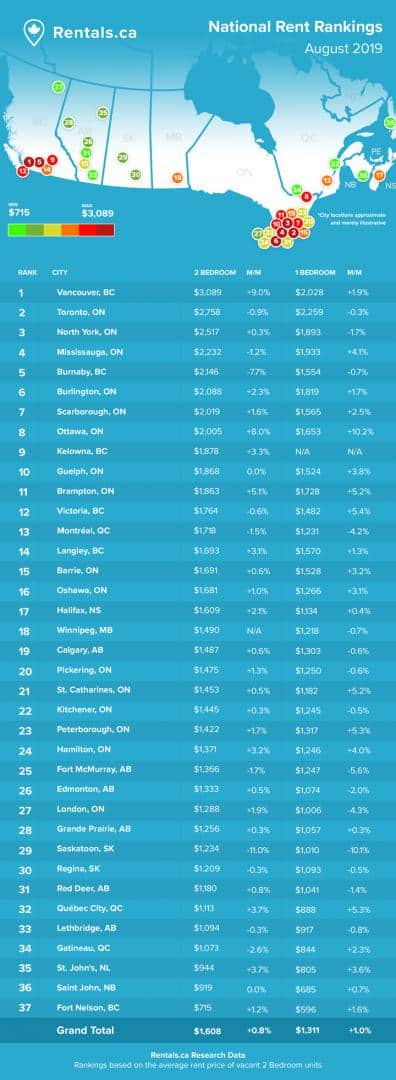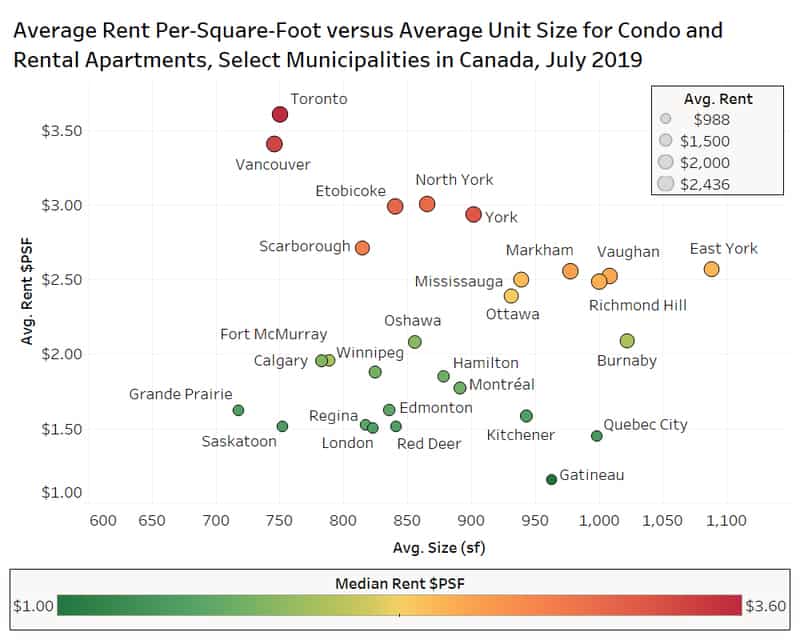One-Bedroom Rentals Getting Even More Expensive in Mississauga
Published August 17, 2019 at 7:34 pm

While Mississauga has long been an expensive city for residents, the urgency of the growing affordability crisis has captured the attention of all levels of government.
In Mississauga–much like other major Canadian cities–rental apartments (which are few and far between due to a persistently low vacancy rate of 0.8 per cent) are becoming increasingly more expensive as desperate tenants search for available suites.
And it looks like low-income earners are most affected by the rental housing crisis.
Data from the recently released August 2019 Rent Report, produced by Rentals.ca and Bullpen Research & Consulting, indicates that affordability for low-income Canadians is worse than that was reported in mid-July by the Canadian Centre For Policy Alternatives (CCPA).
The report says that the rapid rise in rental rates over the last 18 months, which can be attributed to such positive metrics as increased immigration and solid job growth (as well as the controversial the mortgage stress test that has made purchasing more difficult) has hurt low-income workers the most.
The report says that rents are up 8.5 per cent in Canada overall since December.
Rentals.ca data from October 2018 to July confirms this is especially true for low-income Canadians looking for a rental.

The report says Mississauga continues to be expensive for renters as the city finished third of 37 cities listed for average rent for a one-bedroom at $1,933 and fourth for average monthly rent for a two-bedroom at $2,232.
According to the report, prices for one-bedroom apartments are up 4.1 per cent month-over-month. Those seeking two-bedroom units are a little luckier, as unit prices dipped 1.2 per cent.
Eight of the 11 most expensive cities for renters of a two-bedroom are in Ontario.
Not unexpectedly, Toronto and Vancouver continue to lead all cities in average monthly rents. Toronto had the highest average monthly rent for a one-bedroom home at $2,259, but Vancouver had by far the highest average monthly rent for a two-bedroom at $3,089.
So, how bad is the rental environment for low-income earners?
It’s bad.
The report shows that a Canadian making $13 an hour (which is just $1 below Ontario’s $14 per hour minimum wage) would have to work 62 hours a week to afford the average lower-cost rental, maintaining the recommended 30 per cent rent to income ratio.
“On the lower end of rental prices — in the 10th percentile — if $975 per month is 30 per cent of someone’s monthly income ($3,250) and the employee works 40 hours a week for four weeks (160 hours), that worker would need to make $20.31 per hour to afford that unit in July 2019. This is an increase from $18.75 in October 2018, according to Rentals.ca data from October 2018 to July,” the report reads.
The CCPA’s Unaccommodating – Rental Housing Wage in Canada report, which uses data from the Canada Mortgage & Housing Corporation, actually laid out how much renters need to make to afford apartments in specific neighbourhoods in Mississauga.
But while the news isn’t good, it does look like more inventory is making its way to the market. Once more units are available, the market should–ideally–settle.
“As more than 250,000 new housing units are added to the Canadian market, the rent growth experienced since early 2018 should slow down. This is near the highest level of construction in the country in over 25 years,” the report says.
The report says the national average monthly rental rates declined 1.3 per cent in July, following two months of increases. Toronto, Montreal, Winnipeg and Saskatoon all experienced declines monthly, while Ottawa, Vancouver and Hamilton experienced increases.
What are the least expensive cities?
Renters can get a break in Fort Nelson, Saint John, St. John’s, Gatineau, Quebec City and Lethbridge. All six of these cities had average monthly rents for a one-bedroom home under $1,000.

The report notes that, on a provincial level, Ontario had the highest rental rates in July, with landlords seeking $2,283 per month on average (all property types), a slight increase from June ($2,279).
“As expected, changes to the mortgage stress test last year pushed everyone down a rung on the property ladder, resulting in the highest rent growth occurring at the 10th percentile,” said Ben Myers, president of Bullpen Research & Consulting. “This means the people who can least afford an increase in their monthly housing costs are the ones being subjected to the highest rent inflation.”
The report emphasizes–as it should–what we’ve known all along: Those who make less will continue to suffer more until supply can keep up with demand.
“Housing affordability in Canada is a hot topic,” said Matt Danison, CEO of Rentals.ca. “We felt it appropriate to look at what it takes to rent a property at the lower end of the market.”
The National Rent Report charts and analyzes national, provincial and municipal monthly and quarterly rental rates and market trends across all listings on Rentals.ca for Canada.
INsauga's Editorial Standards and Policies